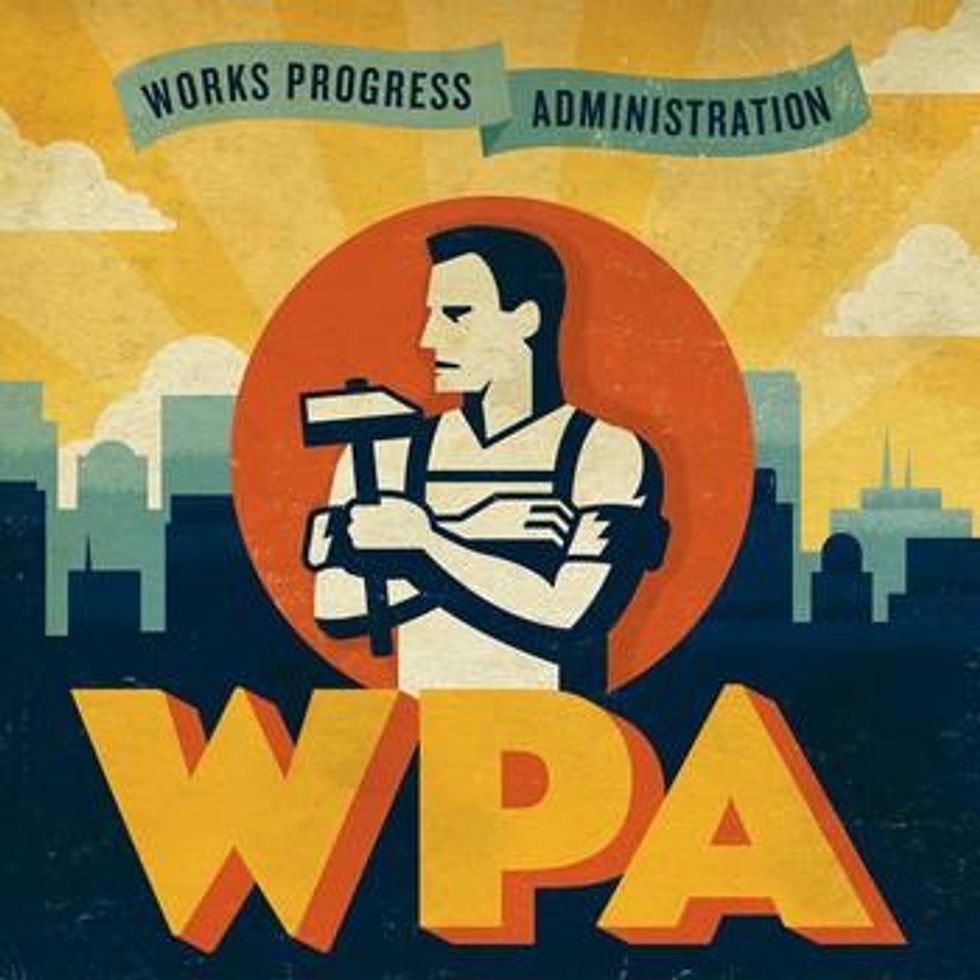September, 09 2011, 02:00pm EDT
For Immediate Release
Contact:
Sam Husseini, (202) 347-0020; or David Zupan, (541) 484-9167
Can Obama Be FDR? -- Or is he Hoover?
RANDALL WRAY, WrayR at umkc.edu
Currently in New York, Wray, is professor of economics at the University of Missouri-Kansas City. He recently wrote the piece "With $300 Billion, The President Could Reduce Unemployment to Zero," which was published by TruthDig and is available on Wray's blog: https://neweconomicperspectives.blogspot.com
WASHINGTON
RANDALL WRAY, WrayR at umkc.edu
Currently in New York, Wray, is professor of economics at the University of Missouri-Kansas City. He recently wrote the piece "With $300 Billion, The President Could Reduce Unemployment to Zero," which was published by TruthDig and is available on Wray's blog: https://neweconomicperspectives.blogspot.com

He said today: "President Obama gave a good, strong speech and the $450 billion plan is 50 percent bigger than rumored. Still, most of the provisions simply extend programs set to expire (the payroll tax holiday for workers, unemployment benefits), or continue tried-and-failed schemes to raise business confidence (tax credits for investment, cutting red tape). Extension of the payroll tax holiday to employers is a good idea, but it won't create many jobs since firms need sales before they will hire. Ditto business tax cuts or deregulation: firms are laying off workers because sales are down, not because they are burdened with taxes and regulations. They need sales before they will hire, and consumers will not buy until they get jobs. We are in a Catch 22 that business confidence cannot resolve.
"Finally, the President's insistence that every dollar in the plan will be 'paid for' by spending cuts or tax hikes elsewhere means that the net benefits must be quite small. Private economists have estimated the plan will create 1.5 million new jobs -- I expect that will prove to be optimistic. But in any case we need 25 million jobs to employ all those seeking work. And note that for $450 billion we could easily create those 25 million jobs if we followed President Roosevelt's example and simply created the jobs directly, through a WPA [Works Progress Administration] new New Deal type program. That could also be used to create all the infrastructure President Obama spoke of plus provide all the public services that we need to bring our nation into the 21st century. And those new WPA workers will generate the sales that firms need to justify more hiring. Now that would really be an American Jobs Act." Wary is also senior scholar at the Levy Economics Institute and his books include "Understanding Modern Money."
THOMAS FERGUSON, thomas.ferguson at umb.edu, https://www.newdeal20.org/author/thomas-ferguson
Ferguson is professor of political science at the University of Massachusetts, Boston and a senior fellow of the Roosevelt Institute. He said today: "We have known for a long time that President Obama is no Franklin Roosevelt. The urgent question now, though, is whether he is Herbert Hoover.
"We won't see the real plan until next week, but here is one way of thinking about his speech. The output gap - the difference between what we could produce and what we are producing - is at least a trillion dollars. Never mind conservative claims that Keynes is dead; the multiplier on government spending right now is probably about 1.5. So a $447 billion plan amounts to a bit more than a half measure. But the chances that our money-driven, highly partisan Congress will enact it all are zero. And I'll believe the talk of large scale mortgage refinancing schemes when I see bankers fly. And that's no detail, it's key, along with measures to make bankers lend instead of buying back their stocks and paying bonuses. Most alarming of all, much of the 'new' spending simply extends existing programs, such as unemployment insurance. It will just hold up aggregate demand at current levels.
"So think of it in Zen terms: we are likely to get half of the famous glass that is half full. But with banks and consumers still intently 'deleveraging' (paying down debts), in the end the new package may, like the earlier stimulus, strike many people as a lot of nothing." Ferguson's books include "Golden Rule: The Investment Theory of Party Competition and the Logic of Money-Driven Political Systems."
A nationwide consortium, the Institute for Public Accuracy (IPA) represents an unprecedented effort to bring other voices to the mass-media table often dominated by a few major think tanks. IPA works to broaden public discourse in mainstream media, while building communication with alternative media outlets and grassroots activists.
LATEST NEWS
Microplastics Make Up Majority of National Park Trash, Waste Audit Finds
“Even in landscapes that appeared untouched,” volunteers found “thousands of plastic pellets and fragments that pose a clear threat to the environment, wildlife, and human health,” said a 5 Gyres Institute spokesperson.
Dec 04, 2025
More than half the trash polluting America's national parks and federal lands contains hazardous microplastics, according to a waste audit published Thursday.
As part of its annual "TrashBlitz" effort to document the scale of plastic pollution in national parks and federal lands across the US, volunteers with the 5 Gyres Institute collected nearly 24,000 pieces of garbage at 59 federally protected locations.
In each of the four years the group has done the audit, they've found that plastic has made up the vast majority of trash in the sites.
They found that, again this year, plastic made up 85% of the waste they logged, with 25% of it single-use plastics like bottle caps, food wrappers, bags, and cups.
But for the first time, they also broke down the plastics category to account for microplastics, the small fragments that can lodge permanently in the human body and cause numerous harmful health effects.
As a Stanford University report from January 2025 explained:
In the past year alone, headlines have sounded the alarm about particles in tea bags, seafood, meat, and bottled water. Scientists have estimated that adults ingest the equivalent of one credit card per week in microplastics. Studies in animals and human cells suggest microplastics exposure could be linked to cancer, heart attacks, reproductive problems, and a host of other harms.
Microplastics come in two main forms: pre-production plastic pellets, sometimes known as "nurdles," which are melted down to make other products; and fragments of larger plastic items that break down over time.
The volunteers found that microplastic pellets and fragments made up more than half the trash they found over the course of their survey.
"Even in landscapes that appeared untouched, a closer look at trails, riverbeds, and coastlines revealed thousands of plastic pellets and fragments that pose a clear threat to the environment, wildlife, and human health,” said Nick Kemble, programs manager at the 5 Gyres Institute.
Most of the microplastics they found came in the form of pellets, which the group's report notes often "spill in transit from boats and trains, entering waterways that carry them further into the environment or deposit them on shorelines."
The surveyors identified the Altria Group—a leading manufacturer of cigarettes—PepsiCo, Anheuser-Busch InBev, the Coca-Cola Company, and Mars as the top corporate polluters whose names appeared on branded trash.
But the vast majority of microplastic waste discovered was unbranded. According to the Coastal & Estuarine Research Federation, petrochemical companies such as Dow, ExxonMobil, Shell, and Formosa are among the leading manufacturers of pellets found strewn across America's bodies of water.
The 5 Gyres report notes that "at the federal level in the United States, there is no comprehensive regulatory framework that specifically holds these polluters accountable, resulting in widespread pollution that threatens ecosystems and wildlife."
The group called on Congress to pass the Reducing Waste in National Parks Act, introduced in 2023 by Sen. Jeff Merkley (D-Ore.), which would reduce the sale of single-use plastics in national parks. It also advocated for the Plastic Pellet Free Waters Act, introduced last year by Rep. Mike Levin (D-Calif.) and then-Rep. Mary Peltola (D-Alaska), which would prohibit the discharge of pre-production plastic pellets into waterways, storm drains, and sewers.
"It’s time that our elected officials act on the warnings we’ve raised for years—single-use plastics and microplastics pose an immediate threat to our environment and public health," said Paulita Bennett-Martin, senior strategist of policy initiatives at 5 Gyres. "TrashBlitz volunteers uncovered thousands of microplastics in our nation’s most protected spaces, and we’re urging decisive action that addresses this issue at the source."
Keep ReadingShow Less
Trump's Bigoted Attack on Somalis Denounced From Minneapolis to DC to Mogadishu
Rep. Ilhan Omar said that the president "fails to realize how deeply Somali Americans love this country.”
Dec 04, 2025
President Donald Trump is being roundly condemned for making bigoted attacks on Somalis, whom he referred to collectively as "garbage" earlier this week.
During a Tuesday Cabinet meeting at the White House, Trump unleashed a racist tirade against Somali Americans living in Minnesota, whom he falsely portrayed as layabouts who sponge up welfare money.
"I don't want 'em in our country, I'll be honest with you," Trump said. "Their country's no good for a reason. Their country stinks, and we don't want 'em in our country. I can say that about other countries too... We're going to go the wrong way if we keep taking in garbage into our country."
Trump then singled out Rep. Ilhan Omar (D-Minn.), a refugee from Somalia, as being "garbage," and then added that "her friends are garbage."
Trump on Somalis: "We're gonna go the wrong way if we keep taking in garbage into our country. Ilhan Omar is garbage. She's garbage. Her friends are garbage." pic.twitter.com/xtRtiTLzLz
— Aaron Rupar (@atrupar) December 2, 2025
Omar fired back at Trump in an op-ed published Thursday in the New York Times in which she said the president was resorting to overt bigotry against her community because he is rapidly losing popularity as his major policy initiatives fall apart.
Omar also defended her community against the false stereotypes deployed by Trump to disparage it.
"[Trump] fails to realize how deeply Somali Americans love this country," she wrote. "We are doctors, teachers, police officers, and elected leaders working to make our country better. Over 90% of Somalis living in my home state, Minnesota, are American citizens by birth or naturalization."
Speaking on behalf of the Congressional Progressive Caucus, Rep. Chuy García (D-Ill.) defended Omar and the Somali community, and called Trump's attacks on them "unacceptable and un-American."
"Not only does Trump's dehumanizing language put a target on her back and put her family at risk, it endangers so many across our country who share her identities and heritage," García added. "We know just how dangerous this racist and inflammatory rhetoric is in an already polarized country."
In an interview with Al-Jazeera, Minnesota state Sen. Omar Fateh (D-62), who is also of Somali descent, said Trump's attacks were "hurtful" and "flat-out wrong" given what many Somalis in the US have accomplished.
"It is a community that has been resilient, that has produced so much," he said. "We are teachers and doctors and lawyers and even politicians taking part in every part of Minnesota’s economy and the nation’s economy."
He also emphasized that Trump's rhetoric was putting the entire Somali community in danger.
“We’ve had our mosques be targeted," he said. "Myself, I had a campaign office vandalized earlier this year, and so we want to make sure that our neighbors understand that we’re standing up for one another, showing up in this time in which we have a hostile federal government."
Trump's bigoted attacks on Somalis are also making waves overseas. Al-Jazeera also spoke with a resident of Mogadishu named Abdisalan Ahmed, who described Trump's remarks as "intolerable."
“Trump insults Somalis several times every day, calling us garbage and other derogatory names we can no longer tolerate," he said. "Our leaders should address his remarks."
Keep ReadingShow Less
Senate GOP Sends Trump Bill Handing Over Arctic Refuge to Big Oil
"Once again, oil and gas development is taking precedence over science-based solutions for conserving wildlife and mitigating climate change," said one campaigner.
Dec 04, 2025
Climate campaigners, conservationists, and Indigenous people vowed to keep defending the Arctic National Wildlife Refuge after US Senate Republicans on Thursday sent legislation that would restart fossil fuel leasing in ANWR's Coastal Plain to President Donald Trump's desk.
All Republicans present except Sen. Susan Collins of Maine supported House Joint Resolution 131. The 49-45 vote came after three Democrats—Reps. Jim Costa (Calif.), Henry Cuellar (Texas), and Vicente Gonzalez (Texas)—joined all GOP House members but Congressman Brian Fitzpatrick (Pa.) in advancing the bill last month.
If Big Oil-backed Trump signs the joint resolution of disapproval, as expected, it will nullify the Biden administration's December 2024 efforts to protect over 1 million acres of land in Alaska from planet-wrecking oil and gas exploration.
"Simply put, the Arctic refuge is the crown jewel of the American National Wildlife Refuge System," Sen. Martin Heinrich (D-NM) said in a Wednesday floor speech against the measure, noting that the area is "home to hundreds of iconic wildlife species."
"The Arctic refuge is also deeply connected to the traditions and daily life of the people who have lived there for thousands of years," the senator continued, ripping "the Trump administration's relentless attacks on public lands."
Heinrich's speech was welcomed by groups including the Alaska Wilderness League, League of Conservation Voters, and Defenders of Wildlife, whose vice president of government relations, Robert Dewey, also blasted lawmakers' use of the Congressional Review Act (CRA) to repeal the refuge's protections.
"Once again, oil and gas development is taking precedence over science-based solutions for conserving wildlife and mitigating climate change. In these instances, the use of the CRA accomplishes nothing meaningful and instead harms iconic species such as polar bears, caribou, wolves, and migratory birds," Dewey said after the vote. "In addition to threatening wildlife, severe regulatory disruption in Alaska is the inevitable result of targeted rollbacks in one of America's most ecologically critical regions."
Andy Moderow, senior director of policy at Alaska Wilderness League, said Thursday that "while we are deeply disappointed by the final vote, we're grateful to see bipartisan support from lawmakers who stood up for the Refuge and upheld a long-standing, cross-party legacy of protecting this truly incredible place."
"America's public lands—including the iconic Arctic refuge—shouldn't be on the shortlist for a public land selloff to the oil and gas industry," Moderow continued. "We'll continue fighting the management chaos brought by today's vote in favor of actions that respect the Arctic Refuge for what it actually is: a national wildlife refuge, and not an oilfield."
Kristen Moreland, executive director of the Gwich'in Steering Committee, a group formed decades ago by Alaska Natives in response to proposed oil drilling in the Coastal Plain, also spoke out after the Senate vote.
"The Gwich'in Nation views the decision by lawmakers to leverage the Congressional Review Act to advance oil and gas development in the Arctic National Wildlife Refuge as a deliberate attempt to undercut the standards and laws that are designed to protect this sacred landscape," Moreland said.
"This action from DC ignores years of consultation and communication with our Gwich'in communities that rely on this landscape for not only our subsistence and survival, but also our culture and spiritual health and well-being," she added. "We stand united in our opposition to any oil and gas development in the Arctic refuge, and will continue to fight this effort from the Trump administration and decision-makers who ignore our voices."
Keep ReadingShow Less
Most Popular


